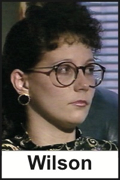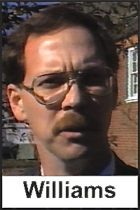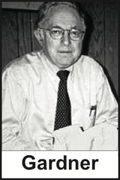Rascals case in brief
In the beginning, in 1989, more than 90 children at the Little Rascals Day Care Center in Edenton, North Carolina, accused a total of 20 adults with 429 instances of sexual abuse over a three-year period. It may have all begun with one parent’s complaint about punishment given her child.
Among the alleged perpetrators: the sheriff and mayor. But prosecutors would charge only Robin Byrum, Darlene Harris, Elizabeth “Betsy” Kelly, Robert “Bob” Kelly, Willard Scott Privott, Shelley Stone and Dawn Wilson – the Edenton 7.
Along with sodomy and beatings, allegations included a baby killed with a handgun, a child being hung upside down from a tree and being set on fire and countless other fantastic incidents involving spaceships, hot air balloons, pirate ships and trained sharks.
By the time prosecutors dropped the last charges in 1997, Little Rascals had become North Carolina’s longest and most costly criminal trial. Prosecutors kept defendants jailed in hopes at least one would turn against their supposed co-conspirators. Remarkably, none did. Another shameful record: Five defendants had to wait longer to face their accusers in court than anyone else in North Carolina history.
Between 1991 and 1997, Ofra Bikel produced three extraordinary episodes on the Little Rascals case for the PBS series “Frontline.” Although “Innocence Lost” did not deter prosecutors, it exposed their tactics and fostered nationwide skepticism and dismay.
With each passing year, the absurdity of the Little Rascals charges has become more obvious. But no admission of error has ever come from prosecutors, police, interviewers or parents. This site is devoted to the issues raised by this case.
On Facebook
Click for earlier Facebook posts archived on this site
Click to go to
Today’s random selection from the Little Rascals Day Care archives….
Click for earlier Facebook posts archived on this site
Click to go to
Today’s random selection from the Little Rascals Day Care archives….
‘I knew right then it couldn’t be true’
 Aug. 24, 2012
Aug. 24, 2012
My EDENTON7 license plate recently caught the eye of a former Little Rascals Day Care parent who left Edenton.
Although Maria – a pseudonym, as she still has family back home – withdrew her daughter from Little Rascals in 1989 after less than two months, it was because of outside circumstances, not because of any dissatisfaction with the care received. “It was a normal day care, clean and quiet,” she says.
The torrent of ritual-abuse rumors started soon after.
She was unsure what to make of it all until a former classmate, Dawn Wilson, was caught up in the dragnet. “Dawn had sat in front of me in high school,” she recalls. “She was quiet and shy, but she opened up to me about wanting to have a baby. She was a loving person. When I heard her name mentioned, I knew right then it couldn’t be true.”
Maria worked at Hardee’s, where she found it “painful to watch” Betsy Kelly’s parents, Warren and Alice Twiddy, being ostracized by their Wednesday-morning coffee klatch. “They were respected people…. She was the clerk of court. It was like she couldnt believe the town was doing this to her.”
Maria’s most surprising observation: “I think PBS (“Frontline”) changed the minds of a lot of people in Edenton. They saw how the gossip and innuendo had worked.”
Ritual-abuse mania contaminated legitimate prosecutions
June 27, 2012
“When well-intentioned but misguided individuals use questioning techniques known to increase the risk of false allegations of sexual abuse, a cascade of unfortunate events can follow.
“Consequences of corruptive interview techniques include the risk of innocent individuals being falsely accused as well as abused children not being believed.”
– From “Forensic Issues in Child Sexual Abuse Allegations” by Charles L. Scott, M.D., in Psychiatric Times (December 1, 2008)
Scott points out a seldom-mentioned but potentially tragic after-effect of the day-care ritual-abuse mania: A loss of credibility for children who actually have been sexually abused. The clouds labeled “McMartin” and “Little Rascals” now hang over every such prosecution.
‘If he made such a statement, it was not a threat’ (!)
 Aug. 3, 2012
Aug. 3, 2012
“Betty Ann Phillips, who had worked at the day care center, said (in the first episode of “Innocence Lost’) that she had complained to (District Attorney H.P.) Williams when she found out that indictments had been filed in her child’s name.
“She said Williams had advised her ‘not to go out on the street and say you’re unhappy with what we have done.’
“‘And then in the next sentence he said, “Because you know that all of the children are saying that you were the lookout while this was going on.”’
“In a telephone interview, Williams did not dispute that he had told Mrs. Phillips he had evidence from other children that she had acted as a lookout, but… if he made such a statement to her it was not meant as a threat.”
– The Associated Press, May 9, 1991
Ideal child prosecution-witness is 3 or 4 years old
 April 11, 2012
April 11, 2012
“Almost always you find the kids are three or four years old.
“The two-year-olds are no good because they can’t speak well enough and are totally unreliable in what they do say. The five- and six-year-olds are already old enough to say, ‘He didn’t do that, lady, and nothing you say is going to convince me of it.’
“But threes and fours are perfect. After they’ve been worked over by a parent or zealous validator, they can be counted on because they believe it and will testify accordingly.”
– Dr. Richard A. Gardner, clinical professor of psychiatry at Columbia
University, quoted in Playboy magazine (June 1992)











0 CommentsComment on Facebook